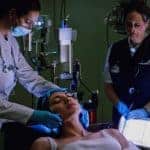Essential Prep for a Nose Job: What to Know
If you’re considering a nose job, also known as rhinoplasty, there are several essential things you need to know and consider before your procedure. Understanding the necessary preparation and key factors can help ensure the best results and a smooth recovery.
What do you need to know before getting a nose job? Here’s what you should keep in mind:
Key Takeaways
- Choosing a qualified surgeon is crucial for a successful nose job.
- Understand the procedure, risks, and potential benefits.
- Have realistic expectations and discuss them with your surgeon.
- Follow pre-surgery instructions to prepare your body for the procedure.
- Proper aftercare is crucial for a smooth and successful recovery.
Choosing a Qualified Surgeon
One of the most important decisions you’ll make for your nose job is selecting a qualified surgeon. Your surgeon should be a nose job specialist with extensive experience and excellent credentials. A board-certified plastic surgeon is the best choice for safety and quality.
When researching potential surgeons, look for evidence of their qualifications, such as certification in plastic surgery or facial reconstructive surgery. Read online reviews from previous patients and check out before-and-after photos of their work.
Choosing a qualified surgeon is essential for achieving optimal results and ensuring the overall safety of your rhinoplasty procedure. Don’t hesitate to schedule consultations with multiple surgeons before making your decision.
Understanding the Procedure
Before undergoing a rhinoplasty procedure, it’s essential to familiarize yourself with the process. There are two main surgical techniques used for nose jobs: open and closed rhinoplasty. Open rhinoplasty is when the surgeon makes a small incision on the outside of the nose, while closed rhinoplasty involves incisions made inside the nostrils. Your surgeon will determine which technique is best for your particular situation.
During the surgery, the type of anesthesia used will depend on the complexity of your procedure. There are typically two types of anesthesia available: local anesthesia with sedation or general anesthesia. Local anesthesia is usually sufficient for minimally invasive procedures, while general anesthesia is necessary for more complicated surgeries. It’s essential to discuss these options with your surgeon during your consultation to determine which option is appropriate for you.
| Risks | Recovery Time | Post-Operative Care Instructions |
|---|---|---|
| The potential risks associated with a rhinoplasty procedure include infection, bleeding, adverse reaction to anesthesia, and poor healing. | The recovery time from a nose job can vary from 1-2 weeks for minor procedures to several months for more complex surgeries. Your surgeon will provide you with specific guidelines for your recovery. | Post-operative care instructions include taking prescribed medication, avoiding strenuous activity, and avoiding certain foods and beverages. You will also need to keep your head elevated and avoid any pressure on your nose. |
Understanding the potential risks and following proper care instructions is essential for a smooth healing process. Be sure to discuss any questions or concerns you have with your surgeon before the procedure.
Setting Realistic Expectations
Before having a nose job, it’s important to have realistic expectations about the potential results. During your consultation with the surgeon, take the time to discuss your goals and concerns, including any limitations that may exist due to your unique facial features. Understanding what can realistically be achieved will help you prepare mentally and emotionally for the outcome of the procedure.
Keep in mind that every person and nose is different, so outcomes may vary. Your surgeon can provide before-and-after photos of previous patients to help you get a better sense of what is possible. Additionally, the final results may not be immediately visible due to swelling and bruising, so patience is important.
Remember that the goal of a nose job isn’t to completely change your appearance, but to enhance your natural features and bring balance to your face. By setting realistic expectations and understanding the potential results, you can approach the procedure with confidence and increase your chances of being satisfied with the outcome.
Preparing for the Surgery
Prior to your rhinoplasty, it’s important to follow the pre-surgery instructions provided by your surgeon. These instructions may include:
- Avoiding certain medications that may increase bleeding risk
- Quitting smoking as it can impair healing and increase complications
- Adjusting your skincare routine to avoid irritation and infection
Additionally, taking steps to ensure your body is in optimal health can contribute to better healing and results. This may involve maintaining a balanced diet, getting enough rest, and staying hydrated.
Following these pre-surgery instructions will help to minimize risks and improve the outcome of your rhinoplasty.
Aftercare and Recovery
After your nose job, following the correct aftercare instructions is crucial for a successful recovery. It’s normal to experience swelling and discomfort for the first few days, and you should rest as much as possible during this time. Applying a cold compress regularly can help reduce swelling.
Your surgeon will provide specific aftercare instructions for your unique situation, which may include avoiding certain activities or medications during the recovery period. Follow these instructions exactly as prescribed to promote optimal healing.
Be sure to keep your nose clean and dry, and avoid blowing your nose or wearing glasses for the first few weeks after surgery to prevent irritation or displacement of the healing tissue.
During the recovery time, which can vary from a few weeks to several months, you should avoid strenuous activity and exercise. You should also avoid prolonged sun exposure, as this can cause swelling and redness.
| Activity | Timeframe |
|---|---|
| Downtime | 1-2 weeks |
| Swelling resolves | 3-4 weeks |
| Resume light exercise | 3-4 weeks |
| Full recovery | 6-12 months |
Remember, it’s important to be patient during the recovery period. Rushing your recovery can lead to complications and jeopardize the final results of your nose job. Your surgeon is there to support you throughout the process and answer any questions you may have.
Conclusion
Getting a nose job is a life-changing decision that requires careful consideration and preparation. By following the essential tips we’ve discussed, you can ensure the best possible results for your rhinoplasty. Remember to choose a qualified surgeon who specializes in the procedure, understand the surgical technique and anesthesia used, and have realistic expectations about the outcome.
Preparing adequately for the surgery by following pre-surgery instructions and taking care of your body can contribute to a smoother healing process. Finally, following the aftercare instructions provided by your surgeon is crucial for achieving the best long-term results.
By keeping these factors in mind, you can approach your nose job with confidence and enjoy a new sense of self-confidence and satisfaction with your appearance.
FAQ
What are some important things to know and consider before getting a nose job or rhinoplasty?
Before getting a nose job or rhinoplasty, it is important to understand the necessary preparation and key factors. By considering factors such as your desired outcome, recovery time, and potential risks, you can ensure the best results for your procedure.
How do I choose a qualified surgeon for a nose job?
When choosing a surgeon for your nose job, it is crucial to select someone who is highly skilled and experienced. Look for a board-certified plastic surgeon who specializes in rhinoplasty. Conduct thorough research by reviewing their qualifications, reading patient reviews, and examining before-and-after photos to gauge their expertise and patient satisfaction.
What should I know about the rhinoplasty procedure?
Familiarize yourself with the rhinoplasty procedure before undergoing surgery. Learn about the surgical techniques involved, such as open or closed rhinoplasty, as well as the type of anesthesia used. It’s also important to understand the potential risks, expected recovery time, and post-operative care instructions to ensure a smooth healing process.
How can I set realistic expectations for the results of a nose job?
It is important to have realistic expectations about the outcome of your nose job. During your consultation with the surgeon, discuss your goals and any limitations that may exist due to your unique facial features. Understanding what can be achieved will help you mentally and emotionally prepare for the results.
What should I do to prepare for a nose job?
Prior to your nose job, it is important to follow the pre-surgery instructions provided by your surgeon. These instructions may include avoiding certain medications, quitting smoking, or adjusting your skincare routine. Taking these steps will help ensure that your body is in optimal health before the surgery, which can contribute to better healing and results.
What should I expect during the aftercare and recovery process?
After your nose job, it is important to follow the aftercare instructions provided by your surgeon. These instructions may include managing post-operative discomfort, reducing swelling, and taking care of your nose during the healing process. Understanding the expected recovery time and adhering to the guidelines will help you achieve the best long-term results.
How can I approach my nose job with confidence?
By knowing what to expect and preparing adequately, you can approach your nose job with confidence. Remember to select a qualified surgeon, understand the procedure, set realistic expectations, and follow proper aftercare instructions. These factors are key to ensuring a successful rhinoplasty.





